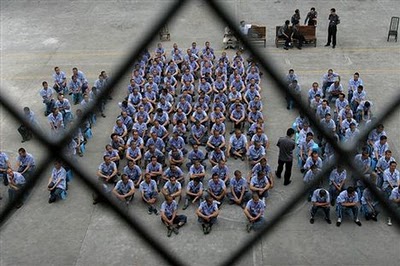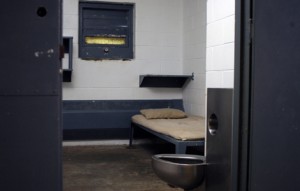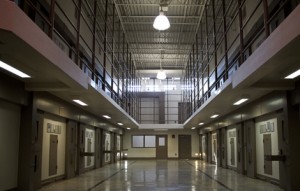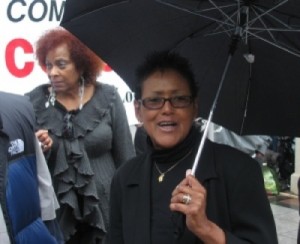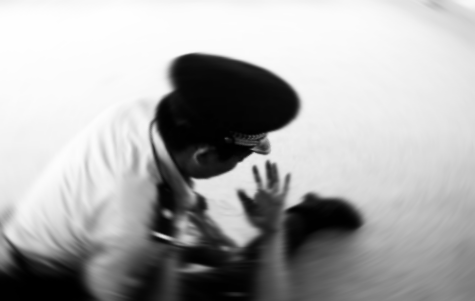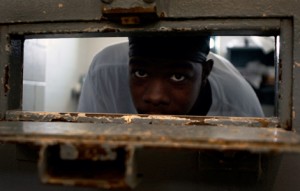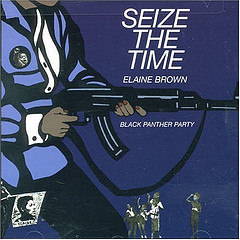Release from: Concerned Coalition to Respect Prisoners’ Rights
Dec. 17, 2010
‘The Concerned Coalition to Respect Prisoners’ Rights, newly-formed to support the interests and agenda of thousands of Georgia prisoners who staged an eight-day peaceful protest and work strike, will hold a press conference at 4 p.m. today at the James H. “Sloppy” Floyd Building following a 3 p.m. meeting with Department of Corrections officials. The delegation will share with the media a letter from the Coalition to Gov. Sonny Purdue and Dept. of Corrections Commissioner Brian Owens and share updates on the strike and conditions faced by prisoners.

Reidsville Prison in GA, where many strike leaders are now housed in strip cells in an abandoned building
While prisoners were able to bring the strike to a peaceful conclusion, Department of Corrections wardens and administrators and Tactical Squads have begun a brutal campaign of retaliation against striking prisoners, particularly those deemed leaders, said Coalition organizers. Many prisoners have been transferred to unknown facilities in overnight transports, most reportedly to an abandoned building at Georgia State Prison in Reidsville to be isolated in strip cells, organizers added. Other prisoners are still suffering from beatings, tear-gassing and other documented violent tactics employed to break the strike and force the men back to work without pay. Still, the prisoners’ demands remain on the table and the Coalition delegation will raise these issues and others with Corrections Department officials.
“The prisoners’ peaceful protest was historic in scope and in the unity of thousands of black, brown, white, Muslim,
Christian, Rastafarian prisoners, including those at Augusta, Baldwin, Calhoun, Hancock, Hays, Macon, Rogers, Smith, Telfair, Valdosta and Ware State Prisons. It ignited protests and support actions all over the country and, even, rumblings of similar protests in other prisons in other states,” said former Black Panther leader Elaine Brown, who has been spearheading much of the support activity and public relations on behalf of the prisoners.
The prisoners are petitioning the DOC for their human rights, including being paid for their labor, provided educational opportunities, decent health care and nutritional meals, a halt to cruel and unusual punishments, and end to unjust parole decisions. “For eight powerful days, these men stood up for their humanity and sent a message of hope and courage to all of us to do the same, to unite and fight to end the social ills that plague our houses on both sides of the wall,” said Brown.
concernedcoalitionga@gmail.com
(ed. note: Publication of this release was delayed because the VOD missed it amid numerous emails until today. Efforts will be made to publish an update soon.)
Also read Dec. 15 Atlanta Journal-Constitution article including quotes from prisoners who called AJC reporters, at http://www.ajc.com/news/prisoners-protest-over-for-778293.html.
What you can do: sign the online petition at http://www.petitiononline.com/wagesnow/petition.html
PRISON REFORM AND APPEALS FOR CHANGE
Dec 15, 2010
(FinalCall.com) – The tone of the late Sunday night conference call was urgent as activists, pastors, media people and loved ones of inmates in several prisons in Georgia listened to Elaine Brown, a former Black Panther Party leader, share the plight of inmates who had gone on strike.
The strike amounted to a peaceful refusal to leave their cells as the men involved, estimated to be several thousand by Ms. Brown, appealed for payment for work, better food, better health care access and more programs or opportunities for education.
Their petition is a common appeal from those who are locked down and likely reflects the desire of hundreds of thousands locked away in prisons and jails inside America. Ms. Brown pointed out that the inmates also found some solidarity with one another in this common cause. They are working together across some racial, so-called gang, religious and other lines of distinctions to take a stand, she said.
She, joined by others in a quickly assembled coalition, appealed to Republican Gov. Sonny Perdue and corrections commissioner Brian Owens to not allow the situation to get out of control and to protect the lives of the men who had undergone self-imposed lockdown by staying in their cells.
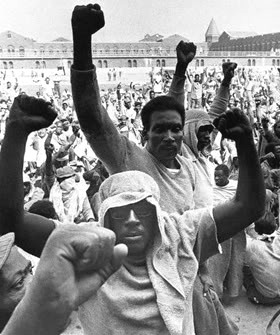
NY Gov. Nelson Rockefeller ordered the murder of numerous heroes of the Attica Rebellion in Sept. 1971, along with guards who were shot along with prisoners by officials firing into D-Block
The last thing activists, advocates and family members of the jailed men wanted was violence—especially violence like the tragedy that unfolded at Attica state prison in New York in 1971. There a standoff between prisoners and guards ended in a hail of gunfire and deaths. In the end, at least 39 people died, including guards, civilian employees and inmates.
At Final Call press time, civil rights and other leaders and activists had held a press conference in downtown Atlanta to again appeal for proper action and restraint from the authorities. Ms. Brown said some inmates had been beaten and others had been “extracted” from their cells by special units inside the correctional facilities.
But, she added, as of Dec. 13 the situation was calmer and an inmate told The Final Call via a cell phone call that some prisoners had been badly injured.
“What we’re saying is we’re not advocating that prisoners go free, or advocating making prisons a cakewalk, but a person in prison even is not to be treated inhumanely. And under some of these conditions, the prisoners are treated like animals,” said Ed DuBose, the president of the NAACP Georgia State Conference. He spoke at a Dec. 13 press conference joined by representatives of the Atlanta mosque of the Nation of Islam and other leaders and organizations. The strike by prisoners started Dec. 9.
Our hope is that the authorities will examine the case made by the men who are under the control of the corrections department and consider and honor those requests that are reasonable. We also hope that there would be no retaliation against the protestors. We also pray that no one—not an inmate, a guard or a corrections employee—be further injured or seriously hurt.
It may seem strange to have inmates speak of petitions or demands or requests but under the American system of jurisprudence, incarceration does not mean the surrender of all rights and any semblance of humanity. One of the most precious rights, freedom, was already taken by society at sentencing.
The U.S. presents her system of justice before the world as a model and criticizes others she accuses of rights denials and brutality. We feel the same standard of basic decency and regard for humanity should exist in Georgia and in institutions across the country that the U.S. would like to impose on nations abroad.
We also feel that this country must learn it cannot lock up its problems or merchandise its way out of social and economic crises by building and sending people to for-profit prisons. States around the country are in severe financial distress and expenses for incarceration are major budget items.
In some states, the official policy is simply to warehouse people until their release date. In many states “correction” or “rehabilitation” are not even part of the official mission, let alone the actual practices, in many penal institutions.
Black America, in particular, should be concerned and pushing for changes and abolition of the prison industrial complex and changes to prison policy.
Blacks are disproportionately jailed and once released, they come right back to our communities
. If no effort was made to enlighten, reform, change or develop these human beings, is it any wonder that recidivism rates are so high and so many Black men go back to jail?
Our plea is that America reconsider her policy of throwing away those who end up in penal institutions and instead embark upon a campaign to renew and restore those she calls her citizens—or allow the Nation of Islam and those who have a love for the incarcerated to work with them. Allow committed organizations and individuals to teach those cast off by society a true knowledge of themselves and their divine connection to the Creator, to teach them how to respect themselves and one another, to teach them proper respect for authority and to teach them the way to peace.
Society can use the hidden gifts and talents these men possess and the millions spent to lock down their bodies can be better spent with those who will help these prisoners free their minds and spirits
. The financial costs and, more importantly, the human costs of locking Blacks, Latinos and poor Whites up and throwing away the key are not sustainable. America needs a new and better way and those who advocate for the least in society can help chart a new and better course.
For background information on Georgia’s prison system, the fifth largest in the country, go to: http://www.georgiatrend.com/features-business-industry/05_10_prisons.shtml

